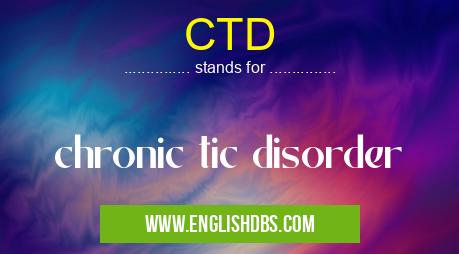What does CTD mean in BRITISH MEDICINE
Chronic Tic Disorder (CTD) is a condition that can cause frequent and prolonged tics, which are involuntary and repetitive muscle movements or vocalizations. CTD can range from mild to severe, and its symptoms vary widely depending on the individual's age, other physical health conditions, and stress levels.

CTD meaning in British Medicine in Medical
CTD mostly used in an acronym British Medicine in Category Medical that means chronic tic disorder
Shorthand: CTD,
Full Form: chronic tic disorder
For more information of "chronic tic disorder", see the section below.
Essential Questions and Answers on chronic tic disorder in "MEDICAL»BRITMEDICAL"
What is Chronic Tic Disorder?
Chronic Tic Disorder (CTD) is a condition that causes frequent and prolonged tics, which are involuntary and repetitive muscle movements or vocalizations.
Who can be affected by CTD?
Anyone can be affected by CTD, but it is more common in children than adults. Symptoms may vary widely based on the individual's age, other physical health conditions, and stress levels.
Are there any treatments available for CTD?
Treatments for CTD depend on the individual's unique condition. Common treatments include behavior therapy, medications such as anti-anxiety drugs and antipsychotics, lifestyle adjustments such as avoiding stressful situations, and relaxation techniques.
How does one cope with the symptoms of CTD?
People coping with the symptoms of CTD can try to reduce their stress levels through activities such as yoga or meditation. They may also need to make changes to their lifestyle such as getting enough sleep or avoiding situations they find triggering.
Can people with CTD lead normal lives?
Yes - while there may be certain challenges associated with having CTD, many people manage to lead successful lives despite their condition through proper management of their symptoms and making lifestyle changes as needed.
Final Words:
Chronic Tic Disorder (CTD) is a condition that affects individuals differently depending on their age, physical health conditions, and stress levels. Treatment options for managing this disorder include behavior therapy, medications prescribed by doctors, lifestyle adjustments such as avoiding triggers or increasing stress-reducing activities like yoga or meditation, and relaxation techniques. With proper management of symptoms and lifestyle changes when necessary, people with CTD can live normal lives despite this disorder.
